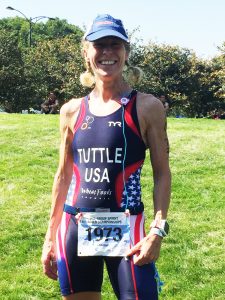Michele Tuttle, Team USA triathlete, won the silver medal placing second in the Sprint Distance (750m swim, 20k bike, 5k run) in the 50-54 age-group for the U.S. team at the 2016 International Triathlon Union (ITU) triathlon in Cozumel today. With a time of 01:13:40, Ms. Tuttle beat her former record set during the 2015 Chicago ITU triathlon.
“Part of the adventure of racing in foreign countries is that only swim, bike, and run are familiar, while everything else is completely different,” said Michele Tuttle, a world class triathlete and registered dietitian of 20 years from Columbia, MD. “So grateful to be able to be racing at this stage of my life and having the strength, tenacity and financial support from my sponsor the Wheat Foods Council, is just incredible –literally, a dream come true.”
The Wheat Foods Council (WFC) sponsored Ms. Tuttle’s training to highlight the role of wheat foods in the diet. As a part of its sponsorship, the WFC featured Michele throughout her training this past year, and she shared insights about her workout regimen, dietary choices and the importance of wheat foods in her training.
WFC: Why did you start competing as an adult? What motivates you?
I’ve always enjoyed having a goal or purpose. Although I love training and exercise, somehow it feels better to know that I’m going to “use” it for something. I started swimming competitively at age 13 and continued through college. After graduating from college, I would sign up for an event every now and then, usually a masters swim meet,
at least once per year. Having a goal means you get up on those cold dark mornings and train when you’d rather stay in bed.
I think my biggest source of motivation for racing is
simply the desire to see where my limits are, physically and mentally. People often say they race and train because they can. The older I get, the more I believe this. I do it because I can. So many people either cannot physically exercise because of health problems, or simply don’t feel the payoff of exercise is worth the hassle or discomfort. For me, I’ve always had to do some form of physical activity to be able to function well in the rest of my life. I wouldn’t say I’m “addicted” to exercise but I really don’t feel good on the days I don’t do some sort of activity. That makes it easy for me: it’s sort of like brushing my teeth. I may be tired, but I do it anyway and am always glad I did.
WFC: Why triathlons?
I like a lot of variety in my life. Whether it’s food or work or physical activity, I really like doing a lot of different things all the time. Triathlons require training in three different sports. At any one time, you might be feeling great in one sport and miserable in another but something good is usually
going on in one of the three. Plus, I love all three sports. And, I love being outside. When you think about it, most kids love to swim, ride their bikes and run around. That’s what triathlons are for me: playtime.
WFC: What do you like best – and least – about competing?
The best part about competing is the anticipation leading up to a race. You’ve put in all kinds of training and
preparation but race day is always where it all has to come together. Things will go right and not so right. I love the feeling of knowing you’ve done everything you can to prepare and now it is sort of out of your hands. Your only job is to do what you can, moment by moment, as you race and deal with the inevitable things that come up that you didn’t plan for (like the weather, a flat tire, a cramp or whatever). I can honestly say that what I like least is that training hard means risking injury. Being injured is the WORST. It’s like being sent to your room without dinner (does anyone do this anymore??)…you have to “rest” to get better which means you can’t train.
WFC: How do you juggle a family, work and training?
First, I have the world’s most supportive husband. He’s
willing to pick up the slack when I can’t do something
because of my training or work schedule. It also helps
tremendously that I work from home. It means I can structure my time to fit my training schedule. Since I don’t commute, I have more time for
training, work and family. Also, I try to do most of my training at times that don’t impact our family time.
At times, this means either getting to work really early (5:30 am) so I can work out mid-day, or squeezing
workouts in between other activities. I won’t say it’s easy to balance the type of training I do with work
and family responsibilities, but it is worth it to me.
WFC: What role do grains play in your diet? Why are they important?
I’ve always, always, always eaten a diet that features lots of grains. And, I’ve been a very active person
my whole life. I get hungry every 2-3 hours no matter what I eat. For me, foods like cereals, breads, and
pasta are staple foods. Of course, I eat other types of grains, too, and I eat whole grains as much as I
can. But, I also include a lot of enriched grains because they’re easy for me to eat and I like them. For
me, grains are especially important because nutritionally, they supply the carbohydrate, iron and B vitamins
that I need a lot of because of my training.
WFC: Share with us some sample menus (breakfast, lunch, dinner, snacks).
Typical Breakfast: whole grain cereal with skim milk and fruit, orange juice and coffee with half and half.
Mid-am Snack: handful of almonds and a kefir or yogurt based smoothie.
Lunch: Hearty soup or stew (leftover from dinner) that usually includes some pasta, beans, and lots of
vegetables, or an omelet with spinach, onions, mushrooms and cheese with an English muffin.
Mid-pm Snack: Pretzels with peanut butter or corn chips with guacamole or hummus and pita chips. I’m
also a big fan of Oreos and milk (shhhh…don’t tell anyone).
Dinner: Hearty soup or stew made with beans, pasta, vegetables, and often beef, salad and bread. Another
night might be something like chicken marsala with tons of mushrooms, served with sautéed spinach
or steamed broccoli and pasta.
WFC: Most of us are not competitive athletes. Are there some key takeaways you can share that we can
all do on a day-to-day basis to eat healthier?
I think the important thing is to set an intention toward what you are trying to achieve. If you want to eat
healthier, you have to first be specific about what you are going to change, then come up with ways to
make it happen. For example, if you are going to switch to a whole grain cereal, you need to make sure
that cereal is available and that you like it. Next, it has to be placed where you are going to remember
to eat it. And, if you normally skip breakfast because of time, you have to get up in time to eat or else
make it possible to bring it with you. In other words, after you set an intention, you have to examine the
barriers and work toward removing them.

